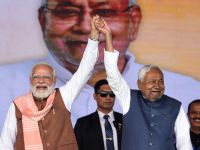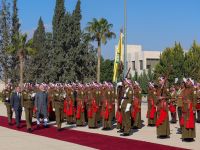Syrian government and rebel delegates at the opening session of talks in the Kazakh capital Astana both called for a shaky ceasefire to be bolstered, but differed starkly on what purpose the truce would serve.
The talks, sponsored by government allies Russia and Iran and opposition backer Turkey, should consolidate the ceasefire for a limited period, the head of the government delegation said in an opening statement reported by Syrian state news agency SANA.
The ceasefire should allow rebel groups wishing to engage in "national reconciliation" and join "the political process" to be separated from Islamic State and the al-Qaeda-linked Fatah al-Sham Front, Bashar al-Jaafari said.
Those terms have previously been used by the government side to refer to deals under which rebel-held towns accepted government control and elections held by the government, which the opposition and its outside backers have dismissed as a sham.
Opposition chief negotiator Mohammed Alloush said his team had come to Astana to ensure genuine implementation of the ceasefire, brokered by Russia and Turkey, which went into force at the end of December.
The ceasefire was needed in order to start work on a political settlement that should involve the departure of President Bashar al-Assad and the "ruling gang," Alloush told delegates seated around a large circular table in Astana's five-star Ricos hotel.
"We have come here to consolidate the ceasefire as a first stage in that process. We will not move on to any further steps unless that is genuinely implemented on the ground," Alloush said in a video of his opening statement published on social media by an opposition advisor.
Alloush lashed out at Iran, one of the sponsors of the talks, saying its forces and proxy militias must be withdrawn from Syria and should be blacklisted as terrorist organizations.
The opposition has said it will only talk about implementation of the ceasefire at Astana and will not engage in political negotiations.
Fighting between the government and rebels has continued around Damascus despite the ceasefire, notably around the rebel-held springs that supply much of the capital's water supply.
Speaking to press after the opening session, government delegation head al-Jaafari hit out at a reference by Alloush to that fighting, saying government forces were taking on Fatah al-Sham militants not covered by the ceasefire in order to ensure water was restored to Damascus.
The head of the opposition Syrian National Coalition's press office, Ahmed Ramadan, told dpa that the actual negotiations in Astana would not be face-to-face "as the time is still not right."
Opening the talks earlier, Kazakh Foreign Minister Kairat Abdrakhmanov told delegates that it was up to all concerned to make the breakthrough "that the Syrian people deserve."
Reading a statement from Kazakh President Nursultan Nazarbayev, he put the meeting in the context of stalled UN-backed political talks between the government and opposition due to restart on February 8 in Geneva.
"I am confident Astana will create the necessary conditions for all concerned parties to find a suitable solution to the Syrian crisis under the Geneva framework," he said.
The Syrian conflict started with peaceful demonstrations against the government of President Bashar al-Assad in March 2011.
It has spiralled into a four-way civil war that has cost hundreds of thousands of lives and driven about half the pre-war population of 22 million from their homes.
Rebels, the government and leftist Kurdish forces - who were not invited to the Astana talks - are also all fighting on separate fronts against the Islamic State extremist organization.
By Weedah Hamzah, Pol O Gradaigh and Shabtai Gold








